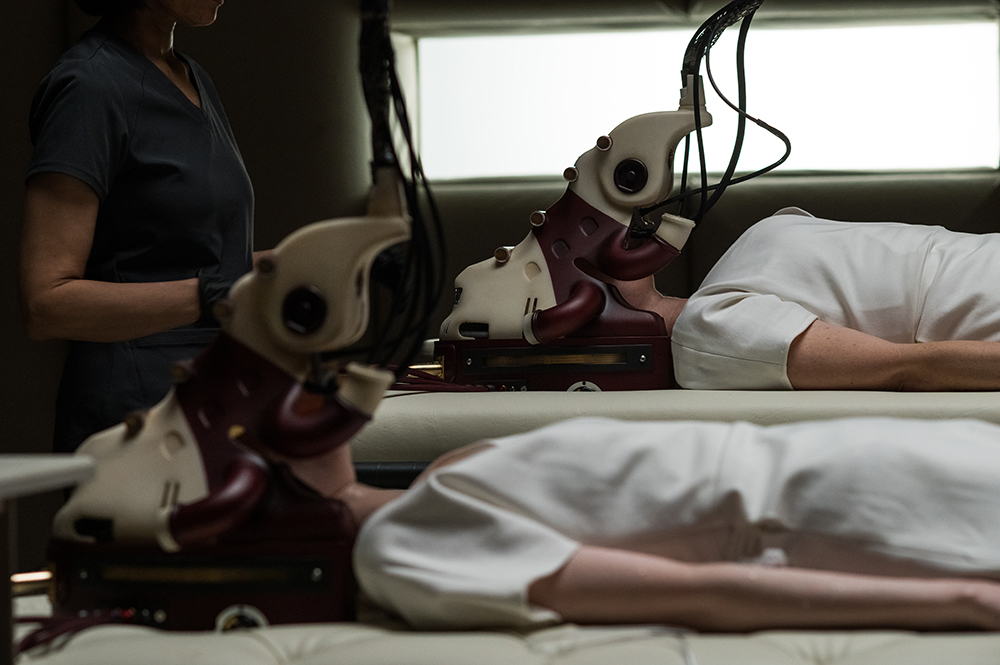We explore themes of abjection, palatable impulse, fractured identity, humanity, and exploitation in the films of Brandon Cronenberg.

The name “Cronenberg” is famous in horror. Among his many talents, David Cronenberg is a pioneer in body horror, and his son, Brandon Cronenberg, and daughter, Caitlin Cronenberg, follow in his footsteps. Brandon’s brand of horror focuses less on the body (though the body does undergo changes) and is more interested in social politics and the disintegration of the mind/self.
His films also have interesting messages about class, money, and our devious human nature.
Possessor (2020)

Possessor is a film about how we try to mask our true identity and subvert our own human nature to appease societal norms and expectations. It questions our ability to fully know and understand who we are at our core, free from who we are programmed to be (through societal conditioning, external interference, and our desire to please others) or who we are told we should be.
It’s also about those who “possess” us and try to shape our identity for their own purposes, typically as a result of greed and the desire to manipulate us.
In an alternate 2008, a woman named Tasya Vos’ murderous nature is embraced for hit jobs through a process of possessing another person’s body through technology and then having the host body commit suicide at the end of the job. In this way, others are implicated in these murders instead of the true villains.
Vos is disconnected from her real life, including her husband and child. She desperately wants to go back to killing and wearing another person’s skin. From her employer’s point of view, these dark impulses are an asset. According to society, she should be locked away or cast out for acting on those undesired impulses.
The company Tasya works for and her handler, a retired assassin named Girder, wants her to sever connections to her family and embrace her killer instincts more fully — not for her sake, but for their own.
Though exhausted, she accepts a high-priority job taking out John and Ava Parse through Ava’s fiance’s body, Colin Tate. The job is botched, and Tate asserts control back over his mind, damaging his implant, so Vos and Tate battle it out for control of his consciousness.
This ends with Vos having to accept who she really is — whether she is still anyone at all or simply a blank slate for others to control.
Infinity Pool (2023)

James Foster, a writer of one book that wasn’t well-received, and his wife, Em, are staying at a posh resort in a third-world country. James crosses paths with Gabi, a beautiful and intriguing woman who gushes about his book and invites him to spend time with her and her husband, Alban.
Gabi comes on to James, and after a drunken day at the beach, James hits a local man with the car, killing him. Gabi warns them that the country is too corrupt for them to call the police; James is caught anyway and told he’ll be put to death by the victim’s firstborn son. He finds out that for a large sum of money, his body can be cloned and that the clone dies in his place (which he is forced to watch).
Em is horrified and urges James to leave, but he soon becomes seduced by the time he spends with Alban and Gabi. He’s intrigued by the idea of wealthy Westerners who purposely commit horrific crimes just so their doubles can die for them, letting them indulge in their depraved desires only to escape punishment.
James wholeheartedly joins their debauchery and has trippy, drug-fueled hallucinations. Eventually, this group turns on James and has him torture a double of himself. Finally horrified, James tries to flee, but he learns he’s in too deep.
We also discover why James has found himself in such a precarious situation and the damaging effect his double life has had on him.
It’s another film about identity, a topic Brandon seems especially captivated by. It explores who we are or would choose to be if we were free from judgment or consequences.
Is there such a thing as inherent, objective morality, or is it simply a construct based on our desire to seek reward and avoid punishment?
Antiviral (2012)

Sickness is and has always been a part of society; in our increasingly celebrity-obsessed world, this worship has consumed us as a society.
In the alternate world of Cronenberg’s Antiviral, blank white walls are everywhere: only celebrity faces provide color. To be the closest you can be to a celebrity, you now have the option to consume their diseases and sickness for a fee intravenously. Something we all hate or once tried hard to avoid, getting sick, is now desirable because these gods and goddesses were sick and hosted viruses in their bodies first.
At first, Syd March, who works for the Lucas Clinic, stands apart from the celebrity obsession and is in the game of selling off diseases on the black market for money. Unfortunately, he finds himself entangled in a war between his company and another for the possession of mega-star Hannah Geist in the form of biological warfare.
Syd injected himself with Geist’s blood to transport it but now falls sick with what ails her. He cuts a deal for a cure, but Geist is not so lucky. After she dies, Syd concocts a plan to further exploit her by creating an “afterlife” program of her. This includes a cell garden from her dead body for sale.
Antiviral is about capitalizing on the lower classes’ obsession with celebrities — leveraging this endless fascination to control us (similar to themes of control in Possessor), distract us from great evils, and manipulate us into buying whatever they’re selling.
The Hypocrisy of the Rich
Nothing the rich do in Cronenberg’s films benefits society; far from it. The younger Cronenberg points out the hypocrisy of the wealthy, who paper over their sins by making them more digestible and absorbed by the masses. I see his movies as metaphors for how society operates now and how it takes advantage of the poorer classes and their foibles.
Exploitation of lower classes is never far from the storyline.
So many celebrities and other ridiculously rich people have been identified as going to Epstein’s horrifying child sexploitation island. The rich are often some of the most deviant; their money buys them whatever their black hearts desire, including things that society deems evil (usually because it is).
The “rich people are weird” subsection of horror exists because, to me, the rich are some of the most empty people. Even when all of their needs are taken care of, and they don’t struggle the way most people do, they aren’t happy. So, they do more and more depraved activities to fill that void and attempt to get their darker impulses out of their systems.
Brandon Cronenberg’s movies expose these hypocrisies and how the rich exploit everyone else in their empty quests for self-realization.
His movies are beautiful, demented, disturbing, and poignant with how he unmasks society’s exaltation of the rich and the continued exploitation of the poor.













Follow Us!